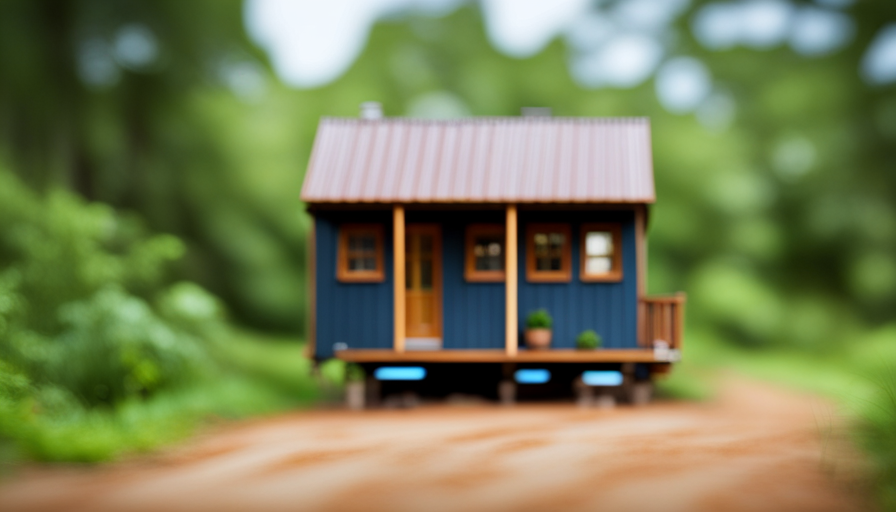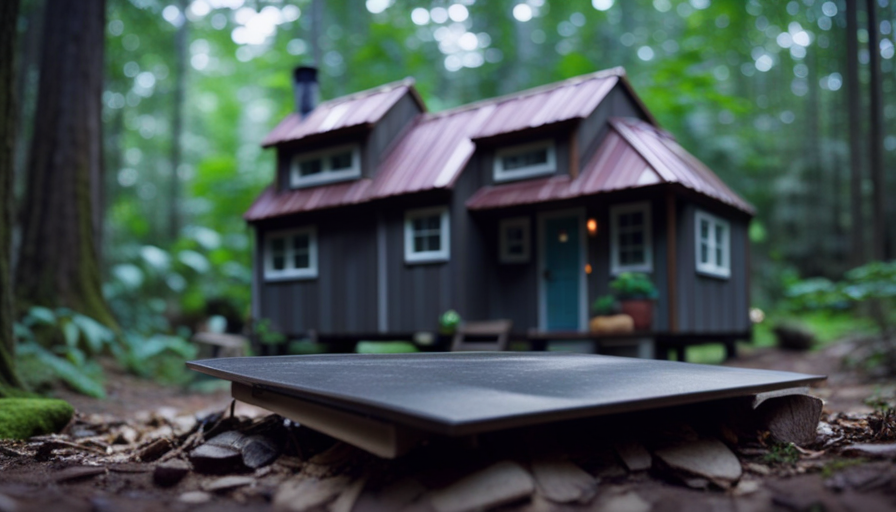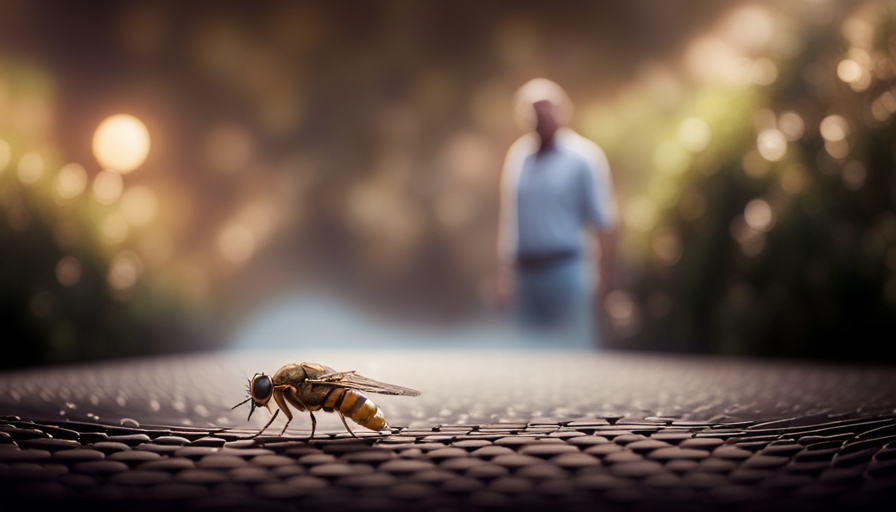- Health risks: Are there any potential diseases that can be transmitted by ants in the house?
- Prevention methods: What are some effective ways to keep ants out of the house to avoid any health risks?
I have been dealing with these stubborn small ants in my home, and I’m sure you can empathize. It seems like I am stuck in an endless game of hide-and-seek with these little creatures.
But fear not, because I’ve done my research and I’m here to share some tried and true methods to get rid of them for good. From natural remedies to chemical solutions, I’ve got you covered.
So let’s roll up our sleeves and say goodbye to those pesky ants together!
Key Takeaways
- Identifying the type of ants in your house is important in order to effectively address the infestation issue.
- Understanding the behavior and nesting habits of tiny ants is essential in finding and eliminating their colonies.
- Natural remedies such as vinegar and water solution, essential oils, and cinnamon can help repel and eliminate tiny ants.
- If natural remedies don’t work, consider using chemical solutions or seeking professional pest control services for a safer and more comprehensive approach.
Identifying the Type of Ants in Your House
I personally find it helpful to identify the type of ants in my house by observing their behavior and physical features. Distinguishing characteristics play a crucial role in determining the species of ants present.

Some common types of household ants include pavement ants, odorous house ants, and pharaoh ants. Pavement ants are dark brown or black with parallel grooves on their heads and thoraxes. Odorous house ants emit a distinct odor when crushed, often described as a rotten coconut smell. Pharaoh ants are light yellow to reddish-brown and have two distinct nodes on their petioles.
In terms of common habitats, ants can be found in various areas of the house, including kitchens, bathrooms, and around food sources. Understanding the behavior and nesting habits of tiny ants is essential in effectively addressing the infestation issue.
Understanding the Behavior and Nesting Habits of Tiny Ants
There are several key factors to consider when understanding the behavior and nesting habits of tiny ants in your house.
These tiny creatures are social insects, living in colonies that can range from a few dozen to thousands of individuals. They communicate and cooperate through chemical signals and pheromones, which helps them locate food sources and establish trails.

When it comes to nesting, tiny ants can build their colonies in various locations, such as in wall voids, under floors, or even in potted plants. Understanding their nesting habits is crucial in effectively eliminating them from your house.
It’s important to note that while ants can be a nuisance indoors, they play a vital role in the ecosystem, helping to decompose organic matter and control other insect populations. However, their presence in food storage areas can contaminate and spoil food, making it necessary to address their infestation promptly and safely.
Natural Remedies to Get Rid of Tiny Ants in Your House
One effective natural remedy to eliminate tiny ants in your house is using a vinegar and water solution. Vinegar, with its strong odor, disrupts their scent trails and confuses them, making it difficult for them to navigate. To create the solution, mix equal parts of white vinegar and water in a spray bottle. Then, simply spray the solution directly onto the ants or their entry points.
Another natural remedy is using essential oils, such as peppermint, lemon, or tea tree oil. These oils have strong scents that repel ants. Mix a few drops of your chosen essential oil with water and spray it in areas where ants are present.

These natural remedies provide an eco-friendly and safe way to get rid of tiny ants in your house. However, if these methods don’t work, it may be necessary to consider chemical solutions for eliminating tiny ants.
Chemical Solutions for Eliminating Tiny Ants
If you’re dealing with a persistent infestation of tiny ants in your house, using insecticide sprays can be an effective solution to eliminate them. However, it is important to consider non-toxic alternatives and professional pest control services for a safer and more comprehensive approach.
| Chemical Solution | How it Works | Pros | Cons |
|---|---|---|---|
| Insecticide sprays | Kills ants on contact | – Easy to use – Widely available – Immediate results |
– Chemical exposure – Harmful to pets and children – Potential environmental impact |
While insecticide sprays can quickly kill ants, they may pose risks to your health and the environment. If you prefer non-toxic alternatives, consider using natural repellents like vinegar, lemon juice, or essential oils. These substances are less harmful and can help deter ants from entering your home.
Another option is to hire professional pest control services. They have the expertise and specialized equipment to effectively eliminate ant infestations. Professionals can also assess the extent of the problem and provide long-term solutions to prevent future infestations.

Preventing Future Infestations: Tips and Tricks
When I encountered a persistent infestation of tiny ants in my house, I took proactive steps to prevent future infestations. Here are some effective ant proofing techniques for your home and long-term strategies for keeping ants out:
-
Seal cracks and crevices: Inspect your house for any openings where ants can enter, such as gaps around doors, windows, and pipes. Use caulk or weatherstripping to seal these entry points.
-
Keep your house clean: Clean up food and drink spills promptly, and store food in airtight containers. Wipe down countertops and sweep floors regularly to remove any crumbs or residue that may attract ants.
-
Remove potential ant habitats: Trim back vegetation that’s in contact with your house, as ants can use it as a bridge to enter. Also, keep firewood and other outdoor items away from the foundation.

-
Use natural deterrents: Certain scents like peppermint, cinnamon, and vinegar can repel ants. Spray these substances around entry points or wipe down surfaces to discourage ants from entering.
Frequently Asked Questions
How Do I Get Rid of Ants in My Garden?
To get rid of ants in my garden, I use organic pest control methods and natural ant repellents. These methods are effective in keeping ants away and maintaining a healthy garden environment.
Can I Use Vinegar to Kill Ants?
Yes, vinegar can be used to kill ants. However, there are also other natural ant repellents that you can consider using as alternatives to vinegar.
What Should I Do if I Have a Severe Ant Infestation?
If I have a severe ant infestation, I would first focus on prevention tips such as sealing entry points and removing food sources. If the problem persists, I would consider professional ant extermination options for effective and long-lasting results.

Are There Any Health Risks Associated With Ants in the House?
There are potential health risks associated with ants in the house. They can contaminate food, spread bacteria, and even cause allergies. It’s important to take preventive measures to avoid these risks.
Can I Use Essential Oils to Repel Ants?
I find that using essential oils for ant control can be effective. However, it’s important to consider the pros and cons of natural ant repellents. While they are safe and eco-friendly, they may not be as potent as chemical options.
Conclusion
In conclusion, by identifying the type of ants in your house, understanding their behaviors and nesting habits, and implementing natural or chemical remedies, you can effectively get rid of tiny ants.
However, prevention is key to avoiding future infestations. Just as a fortress protects its kingdom from invaders, taking proactive measures will safeguard your home from these pesky pests.

Stay vigilant and maintain cleanliness to ensure a ant-free environment.
I’m Theodore, and I love tiny houses. In fact, I’m the author of Tiny House 43, a book about tiny houses that are also tree houses. I think they’re magical places where imaginations can run wild and adventures are just waiting to happen.
While tree houses are often associated with childhood, they can be the perfect adult retreat. They offer a cozy space to relax and unwind, surrounded by nature. And since they’re typically built on stilts or raised platforms, they offer stunning views that traditional homes simply can’t match.
If you’re looking for a unique and romantic getaway, a tree house tiny house might just be the perfect option.
















